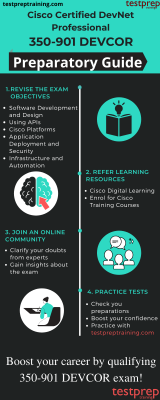350-901 DEVCOR: Cisco Certified DevNet Professional

The Cisco Certified DevNet Professional350-901 DEVCOR exam examines your knowledge of software development and design including using APIs, Cisco platforms, application deployment and security, and infrastructure and automation. This exam tests a candidate’s knowledge of software development and design including using APIs, Cisco platforms, application deployment and security, and infrastructure and automation. This exam enhances your employability and makes your academic records shine.
Preparing for the exam requires great amount of determination and consistency. You need access to the right resources to ace the exam. We provide you with Tutorials and Preparatory Guide that set you on the right track to achieve the 350-901 DEVCOR certification.
Cisco 350-901 DEVCOR Exam
Achieving Cisco Certified DevNet Professional certification proves your skills in developing and maintaining applications built on Cisco platforms. To earn DevNet Professional certification, you pass two exams: core exam and a software developer concentration exam of your choice.
- The core exam focuses on your knowledge of software development and design including using APIs, Cisco platforms, application deployment and security, and infrastructure and automation. The core exam earns a specialist certification, so you get recognized for your accomplishments along the way.
- Concentration exams focus on emerging and industry-specific topics such as enterprise automation, collaboration automation, data center automation, service provider automation, security automation, DevOps automation, IoT, and Cloud.
Core exam: 350-901 Developing Applications Using Cisco Core Platforms and APIs (DEVCOR)
Concentration Exams
- 300-435 Automating Cisco Enterprise Solutions (ENAUTO)
- 300-535 Automating and Programming Cisco Service Provider Solutions (SPAUTO)
- 300-635 Automating Cisco Data Center Solutions (DCAUTO)
- 300-735 Automating and Programming Cisco Security Solutions (SAUTO)
- 300-835 Automating Cisco Collaboration Solutions (CLAUTO)
- 300-910 Implementing DevOps Solutions and Practices Using Cisco Platforms (DEVOPS)
- 300-915 Developing Solutions Using Cisco IoT and Edge Platforms (DEVIOT)
- 300-920 Developing Applications for Cisco Webex and Webex Devices (DEVWBX)
Target Audience
This exam is specially designed for –
- Network engineers expanding their skill-base to include software and automation
- Developers expanding expertise in automation and DevOps
- Solution architects moving to the Cisco ecosystem
- Infrastructure developers designing hardened production environments
Exam Details: Cisco 350-901 DEVCOR
Familiarising yourself with the exam details is an important step before beginning with your preparations. Lets discuss the basic exam details and polices. The Developing Applications using Cisco Core Platforms and API 350-901 DEVCOR exam is a 120-minute exam associated with the Cisco Certified DevNet Professional certification. Further it covers multiple choice and multi-response questions that are available in English language only. This exam costs you $400 USD.
| Exam Name | Developing Applications using Cisco Core Platforms and APIs |
| Exam Code | DEVCOR 350-901 |
| Exam Duration | 120 mins |
| Exam Format | Multiple Choice |
| Exam Fee | $400 USD |
| Exam Language | English |
Exam Prerequisites
For the Cisco 350-901 DEVCOR exam you must have one or more years of hands-on experience in developing and maintaining applications and three to five years of experience designing and implementing applications.
Scheduling the exam
To schedule the exam follow the steps-
- Firstly, Log into your account at Pearson VUE.
- Then, Select Proctored Exams and enter the exam number, 350-901.
- Further, Follow the prompts to register.
Exam Result
Right after completing your exam, you will receive your score report which will be imprinted with your digital photo, captured during admission. The result will also contain a section-wise score breakout along with the passing score. Moreover, you will have the option to share this photo-imprinted score reports with employers. You can also decide to provide them with preferred online access, for verification purposes, at the Authenticate score report. You can confirm the online photo and exam score results on the Pearson VUE candidate tracking webpage. This is an official method.
Exam Retake Policy
If you fail in the exam of Associate, Professional, Specialist, or CCDE level, then you must wait for a period of five (5) calendar days, before becoming eligible for taking a re-attempt. Once you have passed the exam, you must wait for a minimum of 180 days before becoming eligible to take the same exam, with an identical exam number.
Re-certification Policy
Your Cisco 350-901 DEVCOR certification will be valid only for a period of three years. After three years you will have to re-certify yourself to gain desired benefits. You can re-certify yourself by completing education activities, by taking exams, or by a combination of both. These are the ways available for re-certification.
- Firstly, Take an exam
- Secondly, Attend Cisco Live training sessions
- Thirdly, Author content
- Also, Complete online training courses
- Further, Complete instructor-led training
- Moreover, Three-year re-certification requirement
Cisco 350-901 DEVCOR Exam FAQ
To gain more clarity about the exam details and policies visit Cisco 350-901 DEVCOR FAQ
Exam Course Outline
The exam course is a blueprint for your exam. It is a significant part of your preparation journey. Moreover each and every concept covered in the exam requires great attention. You should tailor your study plan around the course domains of the exam to prepare well.
Domain 1: Software Development and Design (20%)
- 1.1 Describe distributed applications related to the concepts of front-end, back-end, and load balancing
- 1.2 Evaluate an application design considering scalability and modularity
- 1.3 Evaluate an application design considering high-availability and resiliency (including on-premises, hybrid, and cloud)
- 1.4 Evaluate an application design considering latency and rate limiting
- 1.5 Evaluate an application design and implementation considering maintainability
- 1.6 Evaluate an application design and implementation considering observability
- 1.7 Diagnose problems with an application given logs related to an event
- 1.8 Evaluate choice of database types with respect to application requirements (such as relational, document, graph, columnar, and Time Series)
- 1.9 Explain architectural patterns (monolithic, services oriented, microservices, and event driven)
- 1.10 Utilize advanced version control operations with Git
- 1.10.a Merge a branch
- 1.10.b Resolve conflicts
- 1.10.c git reset
- 1.10.d git checkout
- 1.10.e git revert
- 1.11 Explain the concepts of release packaging and dependency management
- 1.12 Construct a sequence diagram that includes API calls
Domain 2- Using APIs (20%)
- 2.1 Implement robust REST API error handling for time outs and rate limits
- 2.2 Implement control flow of consumer code for unrecoverable REST API errors
- 2.3 Identify ways to optimize API usage through HTTP cache controls
- 2.4 Construct an application that consumes a REST API that supports pagination
- 2.5 Describe the steps in the OAuth2 three-legged authorization code grant flow
Domain 3- Cisco Platforms (20%)
- 3.1 Construct API requests to implement chatops with Webex Teams API
- 3.2 Construct API requests to create and delete objects using Firepower device management (FDM)
- 3.3 Construct API requests using the Meraki platform to accomplish these tasks
- 3.3.a Use Meraki Dashboard APIs to enable an SSID
- 3.3.b Use Meraki location APIs to retrieve location data
- 3.4 Construct API calls to retrieve data from Intersight
- 3.5 Construct a Python script using the UCS APIs to provision a new UCS server given a template
- 3.6 Construct a Python script using the Cisco DNA center APIs to retrieve and display wireless health information
- 3.7 Describe the capabilities of AppDynamics when instrumenting an application
- 3.8 Describe steps to build a custom dashboard to present data collected from Cisco APIs
Domain 4- Application Deployment and Security (20%)
- 4.1 Diagnose a CI/CD pipeline failure (such as missing dependency, incompatible versions of components, and failed tests)
- 4.2 Integrate an application into a prebuilt CD environment leveraging Docker and Kubernetes
- 4.3 Describe the benefits of continuous testing and static code analysis in a CI pipeline
- 4.4 Utilize Docker to containerize an application
- 4.5 Describe the tenets of the “12-factor app”
- 4.6 Describe an effective logging strategy for an application
- 4.7 Explain data privacy concerns related to storage and transmission of data
- 4.8 Identify the secret storage approach relevant to a given scenario
- 4.9 Configure application specific SSL certificates
- 4.10 Implement mitigation strategies for OWASP threats (such as XSS, CSRF, and SQL injection)
- 4.11 Describe how end-to-end encryption principles apply to APIs
Domain 5- Infrastructure and Automation (20%)
- 5.1 Explain considerations of model-driven telemetry (including data consumption and data storage)
- 5.2 Utilize RESTCONF to configure a network device including interfaces, static routes, and VLANs (IOS XE only)
- 5.3 Construct a workflow to configure network parameters with:
- 5.3.a Ansible playbook
- 5.3.b Puppet manifest
- 5.4 Identify a configuration management solution to achieve technical and business requirements
- 5.5 Describe how to host an application on a network device (including Catalyst 9000 and Cisco IOx-enabled devices)

Preparation Guide for Cisco 350-901 DEVCOR
The level of preparation will determine how well will you perform in the exam. To ace the exam, you need to choose the best set of resources suited to your type and your level of understanding. There are numerous resources that can be used for preparing for the Developing Applications using Cisco Core Platforms and API 350-901 DEVCOR exam This preparatory guide highlights the resources you must include in your preparations.
Step 1- Revise the 300-910 DEVCOR Exam Objectives
The first and the foremost step is to review exam objectives. You must have a clear idea about the exam policies and course structure. Make sure you visit the Official Website of 350-901 DEVCOR exam to have clarity about the same. You must also download the course outline and review all the exam objectives. This will help you prepare better for the exam.
- Software Development and Design (20%)
- Using APIs (20%)
- Cisco Platforms (20%)
- Application Deployment and Security (20%)
- Infrastructure and Automation (20%)
Step 2- Explore the Learning Resources
We cannot stress enough that only finding the right learning resources will allow you to understand each and every domain properly. These resources are meant to supplement your learning experience and exam preparation. Lets discuss some of the very important resources that you must refer:
Cisco Learning plan
The Learning plan by Cisco is designed to help you quickly find what you are looking for by organizing the content according to the exam topics. There are various activities for each exam domains to provide you ultimate clarity of the exam concepts. You need to be logged in to the Cisco Learning Network to access these learning activities
Enrol for Training Course
Training Courses are an integral part of your preparation journey. They provide hands on experience and practical knowledge for solving real world problems using Cisco Application Programming Interfaces (APIs) and modern development tools. The Developing Applications Using Cisco Core Platforms and APIs (DEVCOR) v1.0 course helps you prepare for Cisco DevNet Professional certification and for professional-level network automation engineer roles. You will learn how to implement network applications using Cisco platforms as a base, from initial software design to diverse system integration, as well as testing and deployment automation.
Cisco offers its own training courses for you to ace the exam. The courses are available as follows:
- Instructor-led training: 5 days in the classroom and 3 days of self-study
- Virtual instructor-led training: Equivalent of 5 days of classroom instruction and 3 days of self-study
- E-learning: Equivalent of 8 days of classroom instruction
- Private Group Training: Private group training brings the Cisco classroom experience to your office, or to an offsite location of your choice. This training is a convenient, cost-effective choice for groups with many people who all need the same training
Step 3- Join an Online Community
A healthy discussion is always beneficial, no matter where it is done. The prospects of getting resolutions to an issue increase steeply when a greater number of people are involved. Also, multiple viewpoints make the stuff more dynamic. These discussions make the studies more comprehensive. Moreover, forums work really well to build a community that is essential for understanding others.
Step 4- Self Evaluate with Practice Tests
This final step of your preparations is attempting practice tests. this final step will give the candidate the exact insight of the topics in which they’re lacking. So, make sure you’re going through practice tests after you have gone through the entire syllabus. Most importantly, all the practice tests are designed to encounter the real exam environment around you. Remember to refer the practice tests from authentic sources only. These practice tests will surely boost your confidence and make yourself exam ready. Start Practising Now!


